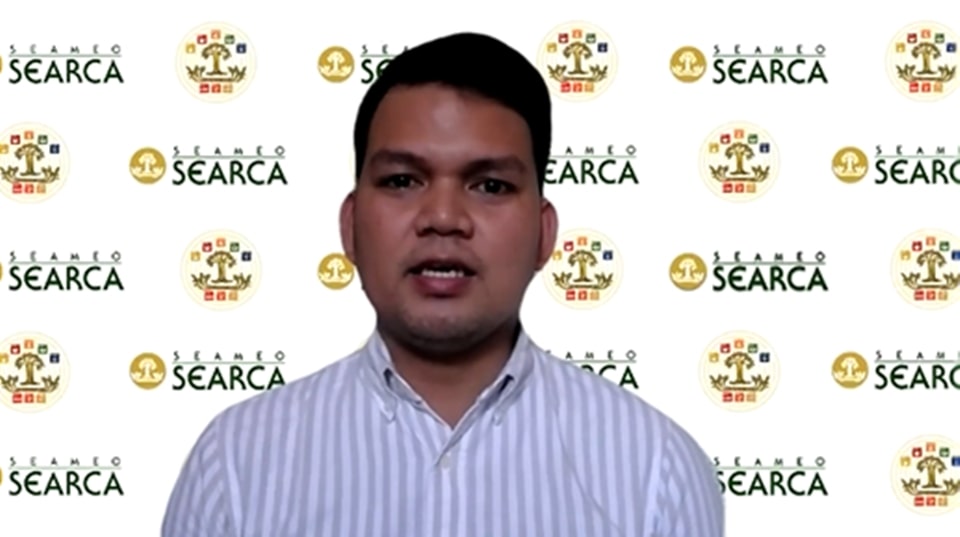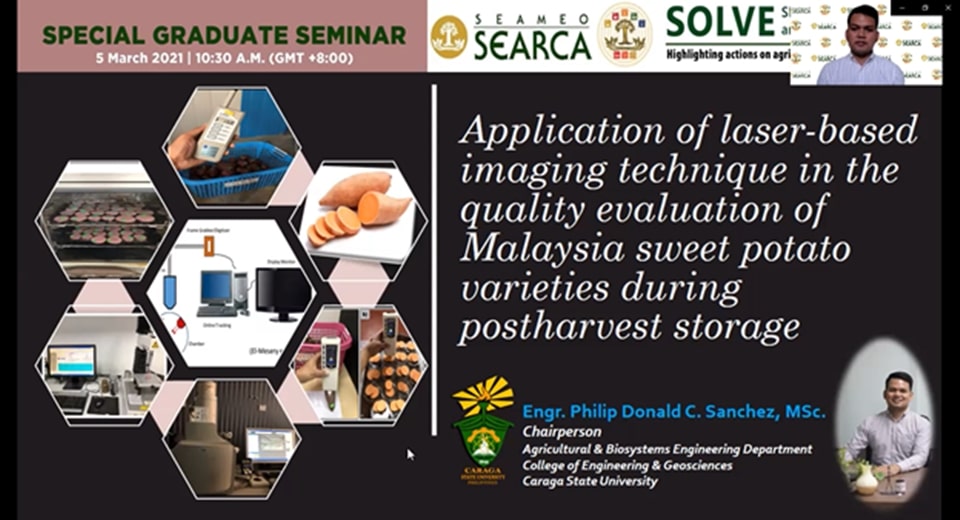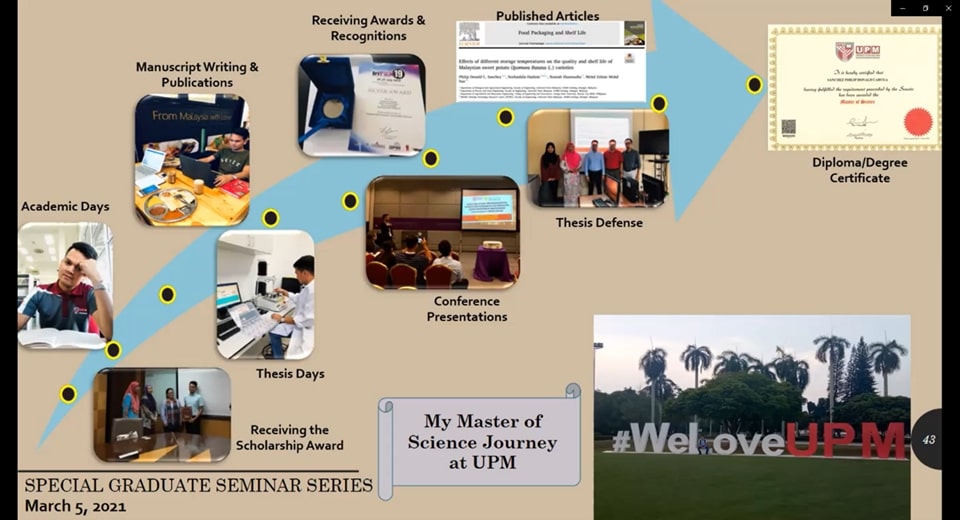 Engr. Philip Donald C. Sanchez, UPM-SEARCA Joint Scholarship alumnus, presented his research on “Application of laser-based imaging technique in the quality evaluation of Malaysia sweet potato varieties during postharvest storage”.
Engr. Philip Donald C. Sanchez, UPM-SEARCA Joint Scholarship alumnus, presented his research on “Application of laser-based imaging technique in the quality evaluation of Malaysia sweet potato varieties during postharvest storage”.
Engr. Philip Donald C. Sanchez shared his Master’s thesis titled “Application of laser-based imaging technique in the quality evaluation of Malaysia sweet potato varieties during postharvest storage” during the Special Graduate Seminar on 05 March 2021.The seminar was organized by the Education and Collective Learning Department (ECLD) and hosted under the SEARCA Online Learning and Virtual Engagement (SOLVE) platform.
Engr. Sanchez received his Master of Science in Agricultural Process Engineering (MSAPE) at Universiti Putra Malaysia (UPM) through the UPM-SEARCA Joint Scholarship Program. Currently, he works at Caraga State University in Agusan Del Norte, Philippines as Chairperson of the Department of Agricultural and Biosystems Engineering, College of Engineering and Geosciences.
 Engr. Philip Donald C. Sanchez’ research has been recognized in numerous conferences as well as published in reputable journals.
Engr. Philip Donald C. Sanchez’ research has been recognized in numerous conferences as well as published in reputable journals.
Engr. Sanchez’ research presented a viable way of post-harvest monitoring, handling, processing, and storage of agriculture crops that prevents damage and wastage. He went in-depth with the issues encountered in conventional quality evaluation of sweet potatoes such as its destructive, costly, tedious, and time-consuming method. His research proposed for the use of laser light backscattering imaging (LLBI) technique on sweet potatoes as a quality monitoring method. Engr. Sanchez evaluated the quality of three different varieties of sweet potatoes during storage and under three different temperatures using the LLBI technique. Results showed that the LLBI technique is a non-destructive and feasible method to evaluate the quality of sweet potatoes during storage. Its implication in the agriculture sector is the possible use of LLBI for online optical quality grading of other agricultural crops towards a non-destructive, automated, and improved production.
 Engr. Philip Donald C. Sanchez also shared about his Master of Science journey at Universiti Putra Malaysia.
Engr. Philip Donald C. Sanchez also shared about his Master of Science journey at Universiti Putra Malaysia.
Besides his research, Engr. Sanchez also shared his journey as a graduate student. Not only did he finish his studies ahead of the standard two-year scholarship duration, but he was also able to publish five journal articles, four of which are in Q1 Journals, or journals belonging to the top 25% in terms of impact factor. Engr. Sanchez also received the Best Poster award at the International Innovation Expo (INTEX) 2019 in Universiti Malaysia Sarawak (UniMAS), Kuching City, Malaysia; Best Oral Presenter & Best Manuscript at the Malaysian Society of Agricultural and Food Engineers (MSAE) Annual International Convention 2020 hosted by the MSAE and Ministry of Agriculture, Malaysia; and Best Paper Award during the 5th International Conference in Agricultural & Food Engineering Joint Conference with the 13th International FRUTIC Symposium hosted by the Universiti Putra Malaysia, Kuala Lumpur Malaysia & FRUTIC Germany. He has attended other international conferences through the SEARCA Travel Grant.
SEARCA continuously offers activities such as the Special Graduate Seminar to highlight outstanding thesis/dissertation and recognize the scholars’ capacity to produce quality research that has great impact in agriculture and rural development. Previously held face-to-face, this year’s graduate seminars will maximize the use of information and communication technology through the SOLVE platform to inform, educate, and share evidence-based solutions and tested technologies, as well as best practices on the ground.